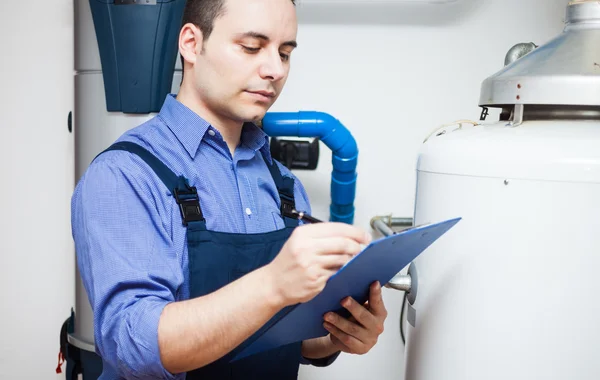Ensuring Efficiency And Safety: A Comprehensive Guide To Boiler Servicing
Boilers are the silent workhorses of our homes and industries, providing warmth and hot water with remarkable efficiency. Yet, like any machinery, they require regular maintenance to operate safely and at peak efficiency. Neglecting boiler servicing can not only lead to decreased performance but also pose serious safety hazards. In this comprehensive guide, we'll delve into the importance of boiler servicing, what it entails, and how to ensure both efficiency and safety.
Why Boiler Servicing Matters
Boiler servicing is not merely a matter of convenience; it's a critical aspect of ensuring both efficiency and safety. Here's why it matters:
- Efficiency: Regular servicing keeps your boiler running efficiently, maximizing its lifespan and reducing energy bills. A well-maintained boiler consumes less fuel to produce the same amount of heat, translating to cost savings and a reduced carbon footprint.
- Safety: Perhaps more importantly, servicing helps identify and rectify potential safety issues. Faulty boilers can leak carbon monoxide, a colorless, odorless gas that can be lethal if inhaled. Servicing involves thorough inspections to detect such hazards early, preventing accidents and safeguarding lives.
- Compliance: Many jurisdictions mandate regular boiler servicing to comply with safety regulations. Failure to adhere to these requirements can result in fines, invalidated insurance policies, and even legal consequences in case of accidents.
The Boiler Servicing Process
Boiler service is an essential maintenance task that ensures your boiler operates efficiently, safely, and reliably. This comprehensive process involves a series of steps conducted by trained professionals to inspect, clean, and fine-tune your boiler system. From checking for potential issues to optimizing performance, boiler servicing is crucial for both residential and commercial properties. Here's a detailed overview of the boiler servicing process:

Initial Assessment:
The servicing process typically begins with an initial assessment of the boiler's condition. The engineer will inspect the exterior and interior components, including the boiler casing, pipework, and controls, to identify any visible signs of damage or wear.
Safety Checks:
Safety is paramount when it comes to boiler servicing. The engineer will conduct thorough safety checks to ensure that all safety mechanisms, such as pressure relief valves, temperature controls, and ventilation systems, are functioning correctly. This helps prevent potential hazards such as carbon monoxide leaks or overheating.
Combustion Analysis:
A crucial aspect of boiler servicing is analyzing the combustion process. The engineer will assess the combustion chamber, burner, and flue to ensure that the fuel is burning efficiently and cleanly. Adjustments may be made to optimize combustion and reduce emissions.
Cleaning and Maintenance:
Over time, boilers can accumulate debris, scale, and soot, which can impair performance and efficiency. During servicing, the engineer will clean various components, including the heat exchanger, burner, flue passages, and filters. Any worn or faulty parts may be replaced to prevent breakdowns and prolong the lifespan of the boiler.
Pressure and Leak Tests:
The engineer will conduct pressure and leak tests to assess the integrity of the boiler system. Pressure tests involve pressurizing the boiler to ensure it can withstand normal operating conditions without leaking. Leak tests identify any leaks in the pipework or connections, which can lead to water damage or loss of pressure.

Efficiency Optimization:
Maximizing energy efficiency is a key objective of boiler servicing. The engineer may adjust settings, such as the fuel-air ratio and thermostat calibration, to optimize energy consumption and reduce heating costs. Additionally, insulation and weather-stripping may be recommended to minimize heat loss.
Performance Evaluation:
Once servicing is complete, the engineer will evaluate the boiler's performance to ensure it meets safety standards and manufacturer specifications. This may involve conducting functional tests, such as heating system checks and hot water flow assessments, to verify that the boiler operates as intended.
Documentation and Recommendations:
Finally, the engineer will provide documentation of the servicing process, including any repairs or adjustments made. They may also offer recommendations for ongoing maintenance and upgrades to improve the efficiency and reliability of the boiler system.
Ensuring Efficiency and Safety: Tips for Homeowners
Ensuring the efficiency and safety of your boiler doesn't stop with professional servicing. Homeowners play a crucial role in maintaining optimal boiler performance and mitigating safety risks. Here are some practical tips to help you keep your boiler running smoothly and safely:
- Regular Inspection: Make it a habit to visually inspect your boiler regularly for any signs of trouble. Look out for leaks, unusual noises, or changes in performance. Addressing issues early can prevent them from escalating into costly repairs or safety hazards.
- Ventilation: Adequate ventilation is essential for the safe operation of your boiler. Ensure that vents and flues are clear of obstructions and properly installed according to manufacturer guidelines. Blocked vents can trap harmful gases like carbon monoxide indoors, posing a significant health risk.
- Carbon Monoxide Detectors: Install carbon monoxide detectors near your boiler and in sleeping areas of your home. These devices can provide an early warning in the event of a CO leak, allowing you to evacuate safely and seek assistance. Test detectors regularly and replace batteries as needed to ensure they are functioning correctly.
- Bleeding Radiators: If you notice cold spots on your radiators or uneven heating in your home, it may indicate trapped air. Bleeding your radiators can release trapped air and improve the efficiency of your heating system. Follow manufacturer instructions or consult a professional if you're unsure how to bleed your radiators properly.
- Monitor Pressure: Keep an eye on your boiler's pressure gauge and ensure it remains within the recommended range. Low pressure can indicate a leak or other issues, while high pressure can put strain on your boiler and its components. Refer to your boiler manual for guidance on maintaining the correct pressure or consult a qualified technician.
Suite 1/01,10 Ferntree Pl, Notting Hill VIC 3168, Australia
Phone:613-8560-0419

